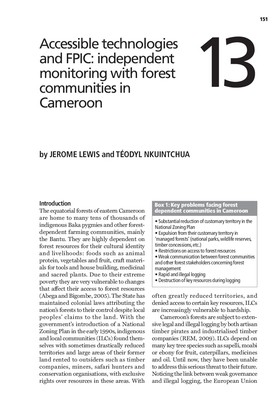Accessible technologies and FPIC: independent monitoring with forest communities in Cameroon (PLA 65)

This article looks at the partnership between communities and a community-based monitoring project on illegal logging and advocacy in Cameroon.
Here both FPIC and BCPs were used to strengthen ownership of the project, following an evaluation which showed weak appropriation of the monitoring technology by participating communities. The first step was to hold extensive consultations with each community so that they could either refuse or give consent to the project, using an FPIC form and checklist to check the understanding of the information given about the project at each stage. If granted, community protocols were then developed to provide the basis for organising activities throughout the project – setting out who would participate in data collection and mapping, how they would participate and their roles and responsibilities.
The process of elaborating FPIC forms and community protocols was important because it enabled most of the challenges and difficulties of implementation by the community to be identified at this stage. The use of accessible technologies and GPS icons designed with community participation, enabled communities to take control of a successful and empowering project.
This article appears in Participatory Learning and Action 65 on Biodiversity and culture: exploring community protocols, rights and consent.
Cite this publication
Available at https://www.iied.org/g03408